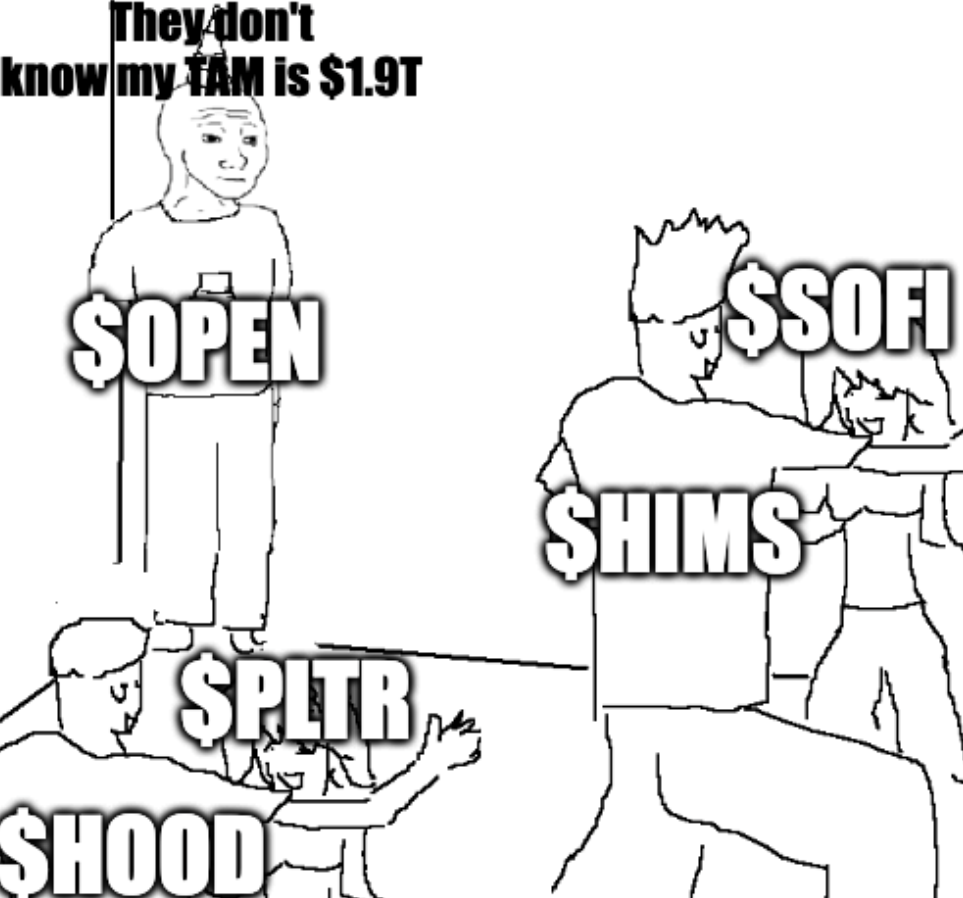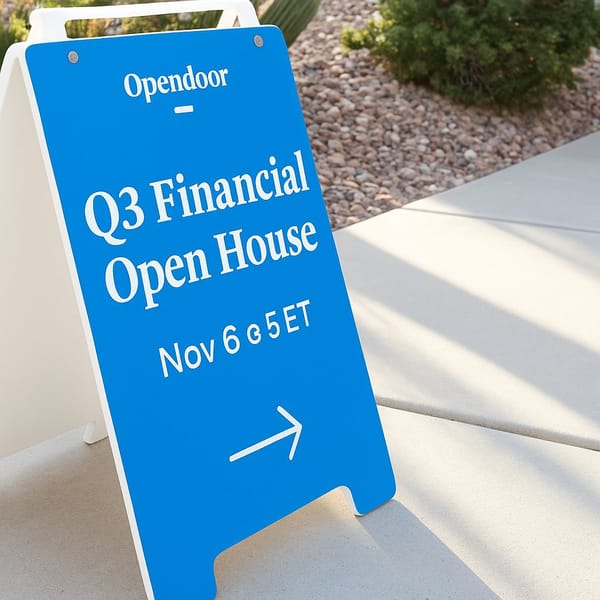The Good, The Bad, and the Opportunity Ahead

As the inaugural post for this site, I thought it might make sense to level-set and take stock of where the core Opendoor business currently sits as of mid-2025.
But first a quick business primer.
What does Opendoor do?
Simply stated, Opendoor is a "market-maker for homes." The company provides liquidity to sellers looking for convenience and certainty and makes money by charging a "spread" that can range from 6-10% (historically pre-2022) to currently likely around 10-15%* of the home value (inclusive of ~5% service fee)
*Opendoor doesn't disclose this number but this range can be roughly estimated based on reported gross margins
Although the comparisons to CVNA may be somewhat overdone, the core value proposition is similar - drop your keys / house off in a convenient, tech-forward process, and move on with your life.
"Never bet against [American laziness]" - (not) Warren Buffet
The Good
Profitability (sorta-kinda): By all estimates, Opendoor is expected to report the first quarter of positive adjusted EBITDA since 2022. This essentially represents the culmination of 3 years of belt-tightening and conservative pricing (eg. asking sellers to take a 10%+ price hair cut for convenience) that has seen the business shrink from a peak of $5.2B in revenue and 12.7K homes sold in Q1 2022 to $1.2B and 2.9K respectively in Q1 2025 (a ~75% drop overall).
Although certainly an important milestone on the way to overall GAAP-profitability, Q2 housing seasonality typically means OD has the highest resale margins and volumes in those 3 months and does not represent their true "seasonality-adjusted" business performance (which is probably trending to roughly adj. EBITDA breakeven for FY 2026 as a base case).
However, I do strongly believe the "fitness" Opendoor has gained over the last 3 years puts it in a solid position to significantly benefit from any shifting of the macro winds. In my opinion, this would likely require mortgage rates around 6% (roughly 75bps from where we are now). Any increase in demand would then quickly flow through to shorter inventory cycles -> lower spreads -> higher volumes -> fast profitability ramp (off a much lower fixed cost base).
However, waiting for rate cuts isn't really a strategy so enter...
Opendoor Key Agent (TM): Almost as important as the march towards core iBuyer profitability is Opendoor's new "Key Agent" program which allows them to monetize more seller leads by funneling a subset towards agents. This could potentially have a significant impact to their bottom line if scaled properly and I found it telling from a management "mind-share" perspective that their two most recent press releases as well as their recent Q1 Letter to Shareholders highlight their progress on this front. This suggests a sizable strategic pivot from the core business - which I'm not sure how I feel about yet.
"... What we're seeing is so far encouraging. We piloted in 11 markets originally and we'll continue to expand the program. This is the path we're going down. We believe this is the right strategy for Opendoor."
- Carrie Wheeler at the 2025 Annual Shareholders Meeting
We don't know much on numbers so far so August 5th earnings will be an especially important one to understand how management is thinking about scaling and what the initial economics and profit contribution could look like. Stay tuned!

Lessons Learned: Through the last 3 difficult post-COVID years, I personally think the MOST important thing gained is an actual understanding of the true economics of the business model in a non-ZIRP era - the realization that, for better (COVID money printing) or worse (500+bps increase in rates), macro matters in this business. The fact that investors and management both now have a clear-eyed understanding of what it might actually take to build Opendoor into a "generational company" is actually a boon - turning "unknown unknowns" into "known unknowns."
In fact, I think the story so far has some clear echoes to not Carvana but another Softbank darling - Uber. The haters said it could never be done, but after getting operational and cost religion under Dara; one of the first things Uber did was enforce much stricter pricing to capture more of the "consumer surplus" (ie. increased prices overall and price discrimination) provided during pre-COVID days. The company then layered in additional products and services and now even advertising - creating a $200B transportation juggernaut. Does Opendoor have a similar Cinderella story brewing under the hood?
The Bad
By far the biggest headwind Opendoor currently faces, as a "market-maker" of sorts, is still a historically low amount of existing home sales turnover (ie. a "housing recession"). We're still recovering from a ZIRP-era hangover where existing home owners are locked into sub-4% rates (constraining supply) and first-time buyers can't participate due to generationally high unaffordability dynamics (constraining demand).

BUT, I think the more important question is 2nd order to current macro conditions. Can Opendoor build something durable that can withstand any future interest rate volatility? Is it reasonable to expect the company to constantly (and perfectly) price interest rate risk for every home or is there another path forward? I don't quite know yet and I feel the company is still trying to figure this out as well.
"Buy a business that a ham sandwich can run" - actually Warren Buffet
The Opportunity
The vision for SPACs was to provide retail with access to early-stage "VC-like" bets that could 100x while public. I believe Opendoor still squarely fits within this camp. In fact, I would probably make the case that Opendoor is really a Series C tech start-up masquerading as a public company. To me the story and the path remain - we just now know that the road is much more fraught with danger than initially believed.

Just the Beginning...
I've been a die-hard Opendoor follower, employee, and shareholder since I joined the company in 2016. In many ways, the company has defined my professional and personal career. Currently, I work at DeepSky (founded by former Opendoor alum) where we're building the next business super-agent and which I used during my diligence process for this article.
This article will be the first of many and I'm hoping to share my thoughts and analysis with candor, clarity, optimism, and a dash of humor. Please subscribe if you want to follow along!



